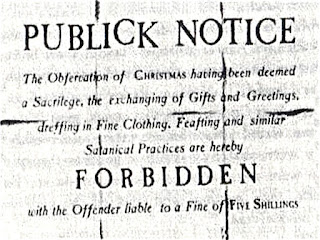In the 17th Century the religious sect of Puritans banned Christmas in England. The offense of having holly in your home or singing a Christmas carol was five shillings which back then equates to our modern money as £28.44 which $36.39 USD! That is 28 pounds or 36 dollars every time you are caught by the Puritan Prohibition Police for singing a carol or harboring Christmas contraband like a evergreen tree!
The Puritan zeal against paganisms in the Christmas holiday were not without merit. The Winter Solstice celebrated by Norse and Druids, and the Romans called it Saturnalia (worship of the sun god, Soli or Saturn). When the Puritans mention Satanic elements in the prohibition they are referring to left overs from paganism like the wreaths which were used to worship Roman and Norse gods, and the bringing into a house the fir tree as the Druid Occultists did and which the Puritans probably cited, “Even their children go to worship at their pagan altars and Asherah poles, beneath every green tree and on every high hill” (Jeremiah 17:2 NLT). The concern the Puritans had about pagan stealth influences was not unwarranted; the Romanite Church had adopted many pagan rites and co-opted them into Christian feasts, Christmas being one of them. In fact, the Emperor Constantine worshipped Sol Invictus (sun god) whose holiday is the Winter Solstice, i.e. Christmas and it seems he was confused between the difference between the True Son of God Jesus Christ who created the sun and all things (John 1:3, Colossians 1:16-18) and the false pagan sun god. Only later at the Council of Nicea would Constantine get a more thorough education on Christianity, that Jesus Christ is Son of God and God Incarnate, One with the Father God and Holy Spirit God who is the LORD God of Israel (Genesis 1:26-2) who is not the pagan-sun god named Saturn. Saturn is in fact Satan, “And no wonder, for Satan himself masquerades as an angel of light.” (1 Corinthians 11:14).
The Puritans sought to purify society and they failed. Like the prohibition of alcohol in 1920-1933 which actually made distillers richer, the Puritan ban on Christmas caused a resurgence of interest in the holiday and possibly has led to legacy it has today. The lesson is prohibition activates the human counter response of wanting it. The Puritans should not have tried to legislate a ban on Christmas, but preach in churches why Xmas can be harmful due to its pagan roots and leave the call to prohibit or not to the individual. This is why the Puritans lost England forever and why they had to try North America. They focused too much on outward holiness and less on the grace of Christ (John 3:16-18, John 6:40, Romans 10:9-10, Acts 15:1-11) and inward holiness that only comes from faith in Jesus (Philippians 3:9).
The moral is the Puritans were not in error to pick at the paganistic influences and warn Christians, but how they went about it was overkill and closed the ears and hearts of people to use Discernment, “Beloved, do not believe every spirit, but test the spirits to see whether they are from God. For many false prophets have gone out into the world. By this you will know the Spirit of God: Every spirit that confesses that Jesus Christ has come in the flesh is from God, and every spirit that does not confess Jesusa is not from God. This is the spirit of the antichrist, which you have heard is coming, and is already in the world at this time” (1 John 4:1-3).
While I do not wish to urge a prohibition of Christmas. I do believe we should be wary of paganisms entering our lives in the guise of Xmas folklore and Christmas decor. I urge discernment and to test anything with Scripture and this simple equation, “does this draw attention to Christ or attention away from Christ (called antichrist); does it make me feel closer to Christ or further from Christ?” Amen.

Comments
Post a Comment